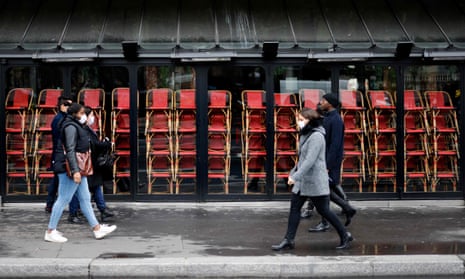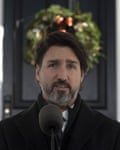We’ve launched a new blog at the link below – head there for the latest:
Death tolls in Italy and Spain surge – as it happened
This blog is now closed. We’ve launched a new blog at the link below:
Tue 24 Nov 2020 18.58 EST
First published on Mon 23 Nov 2020 18.34 EST- Summary
- French president says worst of virus second wave is over and lockdown to ease
- Coronavirus live news: summary of key events
- Number of new infections drops sharply in France
- Spain daily death toll highest of second wave
- Macron expected to set out plans to ease coronavirus restrictions
- Italy reports highest daily death toll since March 28
- Limit of six people at Spanish Christmas gatherings
- Coronavirus live news: summary of latest events
- Russian developers claim that Sputnik V vaccine has 95% efficacy
- 'Serious shortcomings' in Swedish nursing homes, watchdog finds
- Hong Kong to close bars and nightclubs amid renewed rise in cases
- Germany could allow Christmas gatherings of up to 10 people
- Summary
- Japan to suspend domestic travel campaign in two cities
- Border restrictions ease in Australia
- England to cut quarantine period for arrivals from abroad
- Curtailed Christmas could be ‘safest bet’: WHO
- International virus sleuths expected to go to China soon: WHO
- Summary

Live feed
- Summary
- French president says worst of virus second wave is over and lockdown to ease
- Coronavirus live news: summary of key events
- Number of new infections drops sharply in France
- Spain daily death toll highest of second wave
- Macron expected to set out plans to ease coronavirus restrictions
- Italy reports highest daily death toll since March 28
- Limit of six people at Spanish Christmas gatherings
- Coronavirus live news: summary of latest events
- Russian developers claim that Sputnik V vaccine has 95% efficacy
- 'Serious shortcomings' in Swedish nursing homes, watchdog finds
- Hong Kong to close bars and nightclubs amid renewed rise in cases
- Germany could allow Christmas gatherings of up to 10 people
- Summary
- Japan to suspend domestic travel campaign in two cities
- Border restrictions ease in Australia
- England to cut quarantine period for arrivals from abroad
- Curtailed Christmas could be ‘safest bet’: WHO
- International virus sleuths expected to go to China soon: WHO
- Summary
Appearing with first lady Melania Trump in front of the White House, the president made brief remarks thanking healthcare workers and researchers working on a Covid-19 vaccine.
According to tradition, two turkeys named Corn and Cob stayed at the Willard Intercontinental Hotel before the official ceremony. After an online poll, Corn was chosen to be pardoned.
Trump did not take questions at the event, and ignored a shouted question about whether he was considering pardoning himself.

In the UK, three different households will be allowed to mix inside over the festive period under new plans announced today.
But leading scientists have sounded a note of caution. Here is what they plan to do to this Christmas.
Dr Julian Tang, clinical virologist and honorary associate professor in the respiratory sciences department at the University of Leicester
“We’ve agreed to just have Christmas via Zoom/telephone link as we think this is safest. We’re quite used to this now and have been doing it mostly this way for the past 10 months.”
Prof Susan Michie, director of the Centre for Behaviour Change at University College London and member of the government’s Scientific Pandemic Influenza Group on Behavioural Science (SPI-B)
With one household who usually joins us for Christmas Day we are planning to have drinks on the pavement before lunch.
We will probably spend more time outside and less inside, with more distancing, ventilation and lots of warm clothes!
Prof Christina Pagel, director of the Clinical Operational Research Unit at UCL and a member of the Independent Sage group of scientists
It all depends on the Covid situation in December but our plan is to be extra careful (no meetings outside the household) the 10 days before Christmas, so we can then celebrate with my parents who are both in the extremely vulnerable category.

Handling bank notes poses only a low risk of spreading Covid-19, the Bank of England has said, after it commissioned research to find out how long the virus lasts on cash.
The use of notes has dropped sharply in the UK since the pandemic hit in March, and the Bank said one reason could be fears that cash can carry the virus.
After reopening following the first lockdown, many shops and hospitality venues in the UK encouraged consumers to make contactless payments, while some refused to take any cash.
However, the Bank’s research found that the risk of getting coronavirus from handling bank notes was much lower than that of contracting it from breathing air particles in a shop, or from touching items like shopping baskets, door handles or self-checkout terminals.
Its study involved a very high dose of coronavirus, equivalent to someone coughing or sneezing directly on to the bank note, and included tests on paper and polymer £10 notes. After contamination, the notes were stored at room temperature and repeatedly tested.
The study found that the level of virus remained stable for an hour, but over the next five hours it declined rapidly, and after 24 hours it had dropped to less than 1% on both types of note.
Using blood plasma from Covid-19 survivors to treat patients with severe pneumonia caused by the coronavirus showed little benefit, according to data released from a clinical trial in Argentina.
The therapy know as convalescent plasma, which delivers antibodies from Covid-19 survivors to infected people, did not significantly improve patients’ health status or reduce their risk of dying from the disease any better than a placebo, the study published in The New England Journal of Medicine found.
Despite limited evidence of its efficacy, convalescent plasma, which US president Donald Trump touted in August as a “historic breakthrough,” has been frequently given to patients in the US.
In October, a small study from India suggested convalescent plasma improved symptoms in Covid-19 patients, such as shortness of breath and fatigue, but did not reduce the risk of death or progression to severe disease after 28 days.
The new Argentine study involved 333 hospitalised patients with severe Covid-19 pneumonia who were randomly assigned to receive convalescent plasma or a placebo.
After 30 days, researchers found no significant differences in patients’ symptoms or health. The mortality rate was nearly the same at 11% in the convalescent plasma group and 11.4% in the placebo group, a difference not deemed statistically significant.
It is still possible that convalescent plasma might help less-sick Covid-19 patients, study leader Dr Ventura Simonovich of the Hospital Italiano de Buenos Aires said, but more studies would be needed and supplies of the treatment are not scalable.
For patients with severe disease, like the ones in this study, “other therapies based on antibodies could have a role,” he said.
The US Centers for Disease Control and Prevention may soon shorten the length of self-quarantine period after potential exposure to the coronavirus, a top official has said.
Health authorities currently recommend a 14-day quarantine in order to curb transmission of the virus but an official said there is evidence the period could be shortened if patients are tested for the virus during their quarantine.
“Let me confirm that we are constantly reviewing the evidence and we are starting to have evidence that a shorter quarantine complemented by tests might be able to shorten that quarantine period from 14 days to shorter days,” a top US health official said on a press call, Reuters reports.
He added that the decision to change the guidance is not final and experts are still reviewing data to make sure such a change would not put people at risk.
The US government has been criticised by experts and public health officials for being slow to ramp up Covid-19 testing.
It has also distributed nearly 40m out of 150m rapid tests it agreed to acquire from Abbott Laboratories earlier this year, the officials said.
New coronavirus cases in the US are averaging nearly 172,000 a day and have exceeded 100,000 since early November, according to a Reuters tally.
US total deaths due to coronavirus reached nearly 259,000 on Tuesday with over 12.5 million cases.
Scientists have warned the UK’s Christmas coronavirus plans, which will allow up to three households form a “bubble” to meet over the festive period, will cause the virus to spread and lead to further deaths.
Martin McKee, the professor of European public health at the London School of Hygiene and Tropical Medicine, said: “We know that the virus spreads easiest where people mix together, close to each other, for long periods of time indoors. These are exactly the conditions the government seems to be encouraging.”
He urged the government to promote ways of celebrating outside and reducing risks when meeting indoors.
“There is almost no advice on imaginative ways of celebrating the festivities, despite the long history of outdoor seasonal events in this country, and only the briefest mention of ways to reduce the risks indoors, for example by increasing ventilation,” he said.
Paul Hunter, a professor in medicine at the University of East Anglia, said: “Any relaxation of the restrictions over the Christmas period will almost inevitably lead to some increase in transmission and therefore, illness, hospitalisations and sadly deaths.”
However, he said the benefits of allowing families to meet over Christmas may outweigh the risks, and the closure of schools over the holidays will also reduce transmission.
“The benefits on people’s mental health of being to meet up with family over this time should not be underestimated,” he said. “ My personal view is that some relaxation of the rules in line with what is currently being reported will have sufficient benefits to justify the additional risks for the Covid epidemic.
“After Christmas we will still have to live through a few more months of restrictions at least. Christmas, whether or not we celebrate the day as a religious festival, may be what we need to make it through the rest of winter.”
However, he also stressed the importance of a well-managed tier system before and after Christmas as essential for keeping cases down.
Brazil registered a further 31,100 confirmed Covid-19 cases over the last 24 hours and 630 deaths, the health ministry said.
The South American nation has now registered 6,118,708 cases since the pandemic began and the official death toll has risen to 170,115, according to ministry data.
The US Centers for Disease Control and Prevention (CDC) on Tuesday reported a further 157,531 Covid-19 cases, and said the number of deaths had risen by 1,058 to 257,016.
The total number of cases in the country now stands at 12,333,452.
The CDC figures do not necessarily reflect cases reported by individual states.
Summary
Countries across Europe have started announcing their plans to allow people to celebrate during the festive season under coronavirus restrictions - here’s a quick summary:
- Germany’s 16 federal states are likely to approve gatherings of a maximum of 10 people during the festive season, according to a draft proposal due to be discussed on Wednesday by state premiers and the country’s chancellor, Angela Merkel.
The mayor of Berlin, Michael Müller, said he was confident the measures would be adopted, while two state premiers said there was further broad agreement to extend a national “lockdown light” until 20 December to make family gatherings possible. - In France, president Emmanuel Macron announced a three-stage easing of the country’s month-long lockdown, beginning this weekend with the reopening of “non-essential” businesses such as hairdressers and clothes shops, which will have to observe strict distancing rules and close at 9pm.
Churches and some cultural venues will also be able to reopen from 1 December, with a maximum of 30 visitors, and people would be allowed to exercise within a 20km (12-mile) radius of their homes and for up to three hours, rather than the current 1km, one-hour limits.
Providing infection numbers have fallen to about 5,000 a day, lockdown will be formally lifted on 15 December, allowing holiday travel, Macron said – although a nationwide 9pm-7am curfew would be in force except on 24 and 31 December, and all private festive gatherings would be expected to observe strict distancing rules.
A third stage would begin from 20 January, Macron said, when bars, restaurants and clubs should be able to reopen. - In the UK, families will be able to gather in three-household groups of any size over Christmas, bringing warnings from scientists that the plan will almost inevitably see a rise in the number of coronavirus cases. Ministers said the “Christmas bubbles” would require people to make a “personal judgment” over risk for older relatives and others. The new rules will allow people to travel around freely from 23 to 27 December, irrespective of what local tier of Covid restrictions they live in. The relaxation ends on 28 December, and all areas will immediately revert to their previous Covid rules, including over new year.
- The Spanish government is planning to limit festive gatherings to six people and to set a 1am to 6am curfew for Christmas Eve and New Year’s Eve, according to a leaked document seen by Spanish newspapers. “With respect to family gatherings, we recommend they be limited to members of the same household. Should there be an external guest who does not usually live with the family, gatherings should include a maximum of six people and preventive measures must be followed,” the draft says.
- The Finnish capital, Helsinki, meanwhile, is introducing tough new restrictions after a sharp rise in the number of coronavirus cases, with high schools, libraries and swimming pools to be closed and public events banned outright. The Finnish prime minister, Sanna Marin, warned on Monday that a new state of emergency could be declared if regional measures proved ineffective.
- In Sweden, whose light-touch anti-lockdown approach has attracted international attention, the country’s health watchdog criticised “serious shortcomings” in nursing homes, which account for nearly half of Sweden’s 6,400 Covid-19 deaths.
- Russia’s deputy prime minister, Tatiana Golikova, said on Tuesday the country’s coronavirus situation was becoming “more complicated” with the onset of autumn and winter. Russia recorded a record 25,173 new daily infections on Monday.
French president Emmanuel Macron has announced the start of a phased easing of lockdown restrictions.
The progression from one phase to the next will be contingent on coronavirus transmission rates staying on a downward trajectory, he said.
Here are details of the plan:
Phase One - From 28 November
- Lockdown will remain in place, but people will be able to exercise outside for three hours a day, versus the one hour at the moment, and within a 20 km radius of their homes, versus the 1 km radius allowed now.
- Shops selling non-essential good such as clothes, shoes and toys will be allowed to re-open
- Indoor religious services will be allowed to resume, but the number of worshippers will be capped at 30 people.
Phase Two - From 15 December (if new daily infections fall to 5,000)
- Lockdown is lifted
- A curfew will be in place between the hours of 9pm and 7am daily
- Cinemas and theatres will be allowed to re-open
Phase Three - From 20 January (if the number of new infections remains below 5,000 cases per day)
- Restaurants and cafes can re-open
- Lycées (secondary schools) to fully reopen and university courses to resume 15 days later
- Gyms can re-open
Winter sport resorts will not be able to reopen before the end of the year, French president Emmanuel Macron said in a televised address to the nation.
“The government has held talks with the industry, but it seems impossible to consider reopening for the year-end festivities,” Macron said, adding that it would be preferable to reopen in January under good conditions and in coordination with other European countries.
French president says worst of virus second wave is over and lockdown to ease
France will start easing its Covid-19 lockdown this weekend so that by Christmas, shops, theatres and cinemas will re-open and people will be able to spend the holiday with the rest of their family, French president Emmanuel Macron has said.
In a televised address to the nation, Macron said the worst of the second wave of the epidemic in France was over, but that restaurants, cafes and bars would have to stay shut until 20 January to avoid triggering a third wave.
“We must do everything to avoid a third wave, do everything to avoid a third lockdown,” Macron said.
After curfew measures in major French cities in mid-October failed to produce the results the government had hoped for, it enforced a one-month lockdown on 30 October, though it was less strict than a lockdown that ran from 17 March to 11 May.
Positive trends including a decline in hospitalisations for Covid-19 infections, combined with pressure from business lobbies who say they are facing ruin, have led to calls to start loosening the lockdown as soon as possible.
Macron also said he would start a vaccination campaign at the end of December or beginning of January, starting with the most vulnerable and older people. Vaccination won’t be mandatory, he said.
The Guardian’s foreign correspondent Kim Willsher has more information on the exact details of the eased restrictions:
From 15 December:
— Kim Willsher (@kimwillsher1) November 24, 2020
*lockdown lifted can travel between regions and spend Xmas with family
*inside extra curricular school activities can resume
•avoid unnecessary travel. Not Xmas holidays "as before"
*Cinema, theatres museums to open with extra health controls

Hi everyone, this is Jessica Murray taking over the liveblog for the next few hours.
As always, please do get in touch with any story ideas or personal experiences you would like to share.
Email: jessica.murray@theguardian.com
Twitter: @journojess_
Coronavirus live news: summary of key events
That’s it from me today. My colleague Jessica Murray will be taking over shortly. Here’s a summary of the major events so far:
The number of new infections in France dropped sharply against the same day last week, with the figure dropping from 45,522 last Tuesday to 9.155 today.
There were a further 853 coronavirus-related deaths in Italy on Tuesday – the highest daily toll since the end of March - and 23,232 new infections.
A network of 13 African countries has joined forces with global researchers to launch the largest clinical trial of potential Covid-19 treatments on the continent
Spain recorded 537 new Covid deaths, the highest daily toll seen so far in the country’s second wave. The government there is planning to limit Christmas and New Year gatherings to groups of six.
Japan plans to pause its domestic travel campaign in two cities following sharp rises in Covid-19 cases, the minister handling the government’s coronavirus response said on Tuesday.
Sweden’s health watchdog has reported “serious shortcomings” in Covid-19 care for residents of nursing homes where thousands of people have died.
Cases of coronavirus were found in mink farms in Poland, after similar findings in Denmark led the government there to announce a cull of the 15-17 million animals on farms there.
Number of new infections drops sharply in France
The number of new coronavirus infections and the number of people in hospital with the virus in France again dropped sharply as a national lockdown went into its fourth week.
The health ministry reported the number of new cases rose by 9,155 to 2.15 million, compared to 4,452 on Monday - when numbers are usually low due to weekend reporting lags - and compared to 45,522 last Tuesday.
The number of people in hospital with Covid-19 fell by 859 to 30,622, the sharpest drop since the start of the lockdown on 30 October and the number of people in intensive care dropped by 165 to 4,289.
Both series have been falling almost without interruption for 11 days.
France also reported 1,005 new deaths from coronavirus, pushing the total above 50,000 - it now stands at 50,237.
The tally included 454 deaths in hospital over the past 24 hours and 551 in retirement homes over several days. The country reported 500 hospital deaths on Monday.
French president Emmanuel Macron will speak to the country at 8pm (1900 GMT) and is expected to announce some loosening of lockdown regulations in response to the falling infection rates.
Justin Trudeau, the prime minister of Canada, has said that the country will have to wait for a vaccine because the very first ones that roll off assembly lines are likely to be given to citizens of the country they are made in.

Trudeau noted Canada does not have vaccine-production facilities. The United States, the United Kingdom and Germany do.
Trudeau said it is understandable that an American pharmaceutical company will distribute first in the U.S. before they distribute internationally.
“Shortly afterwards they will start honoring and delivering the contracts that they signed with other countries including Canada,” Trudeau said, in remarks reported by AP. “We’re expecting to start receiving those doses in the first few months of 2021.”
In the UK, my colleagues Jessica Elgot and Peter Walker have just published a story saying that up to three different households will be allowed to mix for five days over Christmas.
You can follow our UK live blog for more on this or read the full story here:
Spain daily death toll highest of second wave
Spain recorded 537 new Covid deaths on Tuesday, the highest daily toll seen so far in the country’s second wave. It comes a week after the country hit a record second wave death toll of 435.
Spain logged 12,228 news cases on Tuesday, bringing its total number to 1,594,844. To date, the virus has claimed 43,668 lives across the country.